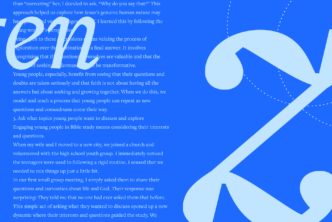Sadly, the daily news plods forward with report after report of some Christian leader’s downfall. Some such cases arise from sexual impropriety. Others center on the abuse of power. Yet others involve financial mismanagement, unresolved conflict, or ministry burnout. And how many similar cases aren’t notorious enough to hit national or international news but are no less destructive to families and local congregations?
Clearly, we live in an age where more Christians—even more Christian leaders—need to move into Wisdom’s house (Prov 9:1) and strive to maintain residence there. We ought to toil not for quick bursts of success or results, but for a steady and lifelong pilgrimage toward the Lord himself, whom we fear.
So having established the basic principles of this journey (part 1 of our study) and having undergone the invasion of those principles into our very hearts (part 2 of our study), we now come to the end of Proverbs 1–9, where Solomon will draw up a plan to stay this course for life. May our study of this text encourage your walk with Christ.
Week 1: The Illusion of Sexual Freedom
Sex began beautifully when husband and wife were naked and unashamed (Gen 2:25), but it went downhill when they decided to love themselves more than God or each other (Gen 3:5, 7, 12, 22). Ever since, we’ve been terribly confused. And the next few chapters of Proverbs are here to help.
Read Proverbs 5 a few times and try to divide the poem into stanzas. Look especially for shifts in metaphor to mark the sections. Once you have tried to observe the stanzas for yourself, refer to note [A] at the end of this study if you’d like more help.
What is the point of each metaphor? For example, the first stanza uses the metaphor of tasting to make the point that, when it comes to a “forbidden woman,” not all is as it seems. A sweet taste may result in bitter, even life-threatening, indigestion.
Continue through the stanzas, identifying the main points of each one (as signaled by its chief metaphor). Then write them down and consider how the point of each stanza leads into or sets up the next one.
A quick note about the “forbidden woman.” We saw in part 1 of this study that Proverbs sometimes uses a literary device called caricature, where the poet exaggerates the features of a scene or situation in order to shine a spotlight on some aspect of it. So, in narrating gang violence in 1:10–19, he wasn’t talking only about street thugs but about “everyone who is greedy for unjust gain” (v.19). Now in chapter 5, he uses the persona of a forbidden woman as a caricature of sexual temptation (this becomes apparent in verses 17–23). So even though Solomon uses the metaphor of a “forbidden woman,” his instruction applies just as much to someone of either sex, regardless of the precise nature of their sexual temptation.
The danger of pursuing or receiving sexual temptation (the “forbidden woman”) is the self-deception involved. This temptation inspires us to trust ourselves and satisfy our own desires. It whispers sweet promises (v.3) of freedom from restraint. Freedom from purity. Freedom for an illegitimate intoxication. But those who are snookered by those empty promises end up filled with regret (7–14), missing out on a guilt-free intoxication (15–19), and caught in a trap of their own making (20–23).
How can this chapter help you to resist the empty promises of sexual temptation? How does it nullify the illusion of sexual freedom? How does it motivate you with a vision for something even better?
Week 2: The Savior, the Sluggard, and the Sower of Discord
It’s funny how much of parenting involves helping one’s children learn not to make dumb choices that hurt themselves and others. One child destroys every tower and confiscates every treasure, then wonders why no other children want to play with him. Another child leaps from couch to coffee table and back again, without considering how far the gap can widen before something bad happens. Yet another finds a bag of sweets, devours the entirety in secret, and moans over the ensuing tummy ache.
Solomon speaks now like a father, cautioning his children against three foolish behaviors we are prone to fall into. Staying the course of wisdom for life requires that we acquire the foresight to avoid these dangerous lifestyles and their disturbing consequences.
Read Proverbs 6:1–19 a few times, marking where the topic shifts from one kind of fool to the next. (See note [B] if you need some help.)
Observe the way Solomon speaks to or about each type of fool. How do his tone and labels shift from the first to the last? (See note [C].)
For each of the three types of fool, identify:
- What exactly does this person do?
- What motivates them to do what they do?
- What are the results of their behavior?
- What counsel is offered to prod them in a different direction?
- What ought to motivate them toward wisdom (moving toward the Lord instead of themselves)?
For each of the three types of fool, consider frankly:
- How are you tempted to follow the fool’s path?
- What motivates you in this direction?
- How does the wise counsel of this text speak into your situation?
- What hope can you have that Jesus died for such fools?
- How does this text motivate you to go in a different direction?
- What steps can you take now to invest in a better future?
Week 3: The Consequences and Conquerability of Immorality
In Proverbs 1–9, Solomon warns of two chief obstacles to wisdom. These two barriers prevent you from becoming wise because they compel you to listen to and “move toward” yourself instead of the Lord. We saw the first obstacle in Prov 1:10–19 (in part 1 of this study): the desire for more stuff. The second obstacle—the desire for more pleasure—was introduced in 2:16–19 and highlighted in 5:1–23.
And we’re not done with that desire for more pleasure yet. This ensnaring deception will require two more weeks to unravel. If we are to gain the wisdom to resist this foe which has slain many a Christian in our day, we require both persuasion and foresight. We must be persuaded to believe that sexual idiocy is both conquerable and utterly not worth it. And we must foresee the deceitful tactics of seduction so that we might properly recognize and resist them. The next two weeks of our study will address these two matters.
First, are you willing to be persuaded that sexual immorality is both conquerable and utterly not worth it? Read Proverbs 6:20–35 a few times.
Solomon wishes to persuade us that sexual immorality is utterly not worth it. Make a list of every negative consequence described in this poem. Dig into every phrase and try to craft a specific label for what will happen to the person who falls into this sin. I have found ten distinct consequences. Don’t flip to consider note [D] until you have at least that many on your own list. Then head back there if you’d like to compare notes with me.
Why do you think he goes so hard on all these negative consequences? Is he trying to shame or guilt you into doing what he wants? Is he trying to take away your fun? Is he saying there’s no hope if you’re already guilty? Remember that it is a sign of God’s grace when he shows you the consequences of your sin while there’s still time to turn from it (Romans 6:23, 1 Corinthians 6:9–11, Titus 2:11–14, 2 Peter 3:9). If you are reading this, it means your time is not yet up. The most important step in this realm of your life may be the very next one you take. Your Savior is ready and waiting to dump his storehouse of wisdom on you. The Lord Jesus died like a fool so fools like us could be wise like him.
Before moving on to the next passage, we ought to notice that there is more here than a list of negative consequences. The passage begins (vv.20–23) with a number of imperatives (commands) and promises designed to inspire hope that this sin can be overcome with the Lord’s help. Make a list of those commands and the promises. How might these commands and these promises inspire you to make different choices? How can you “bind them on your heart always”? Might it be worth memorizing this passage now, in time of strength, that you may call upon it when you feel weak in temptation?
Sexual immorality is always a choice. You are not an innocent victim. You are not a helpless slave. You don’t have to live with this behavior forever. You do not have to continue submitting to this harsh master. The true lover of your soul offers you a way out. He offers you himself.
“The reproofs of discipline are the way of life” (Prov 6:23). Do you want life? God delights to give it, so come to him and get your fill.
Week 4: The Tactics of Seduction
When a war is on, accurate intelligence brings great advantage. If you know your foe’s plans before he finds out yours, you can anticipate his maneuvers and exploit his vulnerabilities. Satan has been taking this very approach with the children of the living God for generations. It’s time we got better at employing it ourselves.
The Lord has revealed to us the enemy’s precise battle plans. All we need to do is listen and pay attention so we can outflank and outmaneuver the opposition. Read Proverbs 7 a few times.
Sexual immorality is once again personified as a “forbidden woman,” and her seductive tactics are put on display in the poem’s central stanza (verses 10–20). Make a list of all her behaviors attempting to seduce the young man. If you want to compare notes with me, see note [E]. Which of these tactics have you fallen for in the past? Which tactics have worked on others close to you? Now that you have a clear sense of immorality’s battle plans, what can you do to prepare in advance for the assault? What resources are at your disposal to unmask the deception and abide in the truth?
In the poem’s outer stanzas (1–5, 6–9, 21–23, and 24–27), we see that much of the battle is a battle of words. In those stanzas, how are Solomon’s words and the adulteress’s words similar? How are they different? What can you do now to treasure up Solomon’s commandments within you (v.1)? If you fail to prepare, how will smooth and seductive words fill the gaps in your heart (vv.3, 7)?
Week 5: Wisdom in Review
In many ways, Proverbs 8 summarizes the entire worldview drawn out in the first seven chapters. Wisdom is once again personified as a woman crying aloud in public (similar to 1:20–33), inviting us to learn from her that we may find life.
Read Proverbs 8 a few times. This week, I’ll leave much of the study work up to you, but here are some prompts to get you started:
- As usual, divide the text into stanzas. Look for changes in metaphor, pronouns, or subject to mark the divisions.
- Identify the main point of each stanza.
- Consider how each stanza’s main point flows into the next one to make a sustained argument. See note [F] if you’d like some help.
- What is the entire poem’s overall message?
- How does that overall message connect to or prepare us for the person and work of Jesus Christ?
- What will you do in response to this message?
- How can you help to disciple others in obedience to this message?
You can’t delight in wisdom without delighting in Yahweh, Lord of heaven and earth. And because of what God has done in Christ, this wisdom now delights in you. You and I may have nothing of our own to offer. But God in his grace delights to draw us in and make us his own. His favor and life are stored up, ready for immediate disbursement to those who love his Son, Jesus Christ. If you grasp Christ, your wisdom from God, your life will never again be the same.
Week 6: Choose Your Restaurant Wisely
Proverbs 9 reminds us that we always have a dining choice. When hunger (for life, fulfillment, advice, or simply “something more”) drives us to seek sustenance and satisfaction, we will look for a good restaurant. Some will find a reputable proprietorship; others will be terribly deceived. Make sure you eat at the right place.
Read Proverbs 9 a few times and write down all the similarities and differences between the two ladies, Wisdom and Folly. How do the similarities help you recognize wisdom’s counterfeits? How do the differences motivate you to partake of the right feast?
Now what exactly is Wisdom’s house, which she “has built” (v.1)? And what exactly is the feast to which she invites us (vv.5–6)? Because of this poem’s placement at the conclusion of the lengthy introduction (chapters 1–9) to the book of Proverbs, I am on board with Bruce Waltke’s proposal:
The representation of Wisdom as having built her house and prepared her banquet may represent figuratively the prologue [chapters 1–9] and the Collections [chapters 10–31] respectively. The house (i.e., the introductory prologue) is now finished, and the banquet (i.e., the proverbs of Solomon) is about to begin. Her messengers (i.e., the parents) have been sent to invite the uncommitted and dull youth to eat and drink her sumptuous fare. Their sons are already waiting for Wisdom to open her doors.1
The feast has been laid before you, and it was meant to be shared. How will you identify the right people with whom to share it (9:7–12)? And as you move forward to study the rest of the book of Proverbs, how will the framework of chapters 1–9 help you to interpret it properly? How does Wisdom’s “house” prevent you from reading the remaining proverbs as simply an anthology of secular self-help?
Study Notes
[A] The chief metaphors in Proverbs 5 are: tasting (and enjoying or suffering the consequences of imbibing—verses 1–6), regretting one’s condition at the end of the path (verses 7–14), drinking from an intoxicating fountain (verses 15–20), and being ensnared in a trap (verses 21–23). [B] Verses 1–5 address the one who puts up security for a neighbor; that is, a person who co-signs loans, enabling their acquaintances to borrow and spend money they don’t have. Verses 6–11 address the sluggard, who makes a habit of unwise choices that are small (v.10) but have disastrous consequences (v.11). Verses 12–19 consist of two four-verse stanzas united by the idea of “sowing discord” (vv.14, 19). [C] In the first case, Solomon speaks to his “son” as one who may have put up security for a neighbor (Prov 6:1). In the second case, there is no address as “son,” but he still speaks directly to the “sluggard” (Prov 6:6). In the third case, he doesn’t use direct address but only third person pronouns to describe the “one who sows discord” (Prov 6:14, 19). In addition, the tone gets increasingly blunt and harsh with each of the three, until the sower of discord is considered an “abomination” whom “the LORD hates” (Prov 6:16). [D] Ten terrible consequences of sexual immorality, or ten reasons to resist it: 1) You’ll participate in evil (6:24). 2) Your desire will take you captive (v.25). 3) You’ll lose everything (v.26). 4) Your punishment is inevitable (vv.27–29). 5) You can’t repay what you’ve stolen (vv.30–31, 35). 6) You’ll lack sense (v.32a). 7) You’ll destroy yourself (v.32b). 8) You’ll create your own wounds (v.33). 9) You’ll find dishonor and disgrace (v.33). 10) You’ll lose every time (v.34). [E] Eleven deceptive tactics of seduction from Proverbs 7: initiative (10, 15), dress (10b), commonality (i.e. showing up everywhere, presumed to be a normal part of every person’s common habit or weakness — 11–12), touch (13a), foreplay (13b), appearance of piety (13–14), taste (peace offerings were the only sacrifice cooked and eaten by the worshiper — 14), sights (16), smells (17), sense of adventure (18), and assurance of secrecy (19–20). Notice how the tactics are fully sensual (using all five senses) and designed to make the poor fool feel like a million bucks. [F] Argument of Proverbs 8: Wisdom is available to those who hear (1–11). Wisdom begins with the fear of the Lord and bears fruit beyond imagining (12–21). Wisdom is intimately acquainted with the Lord himself and woven into the fabric of creation (22–31). Therefore, wisdom can deliver divine blessing to those who listen and keep her ways (32–36).***
This article was originally published in the November/December 2021 issue of Bible Study Magazine. Slight adjustments, such as title and subheadings, may be the addition of an editor.
Related articles
- How to Do In-Depth Study of God’s Word (3 Steps)
- Proverbs: A Heart Shaped for God’s Wisdom (Part 2)
- Proverbs: A Plan to Stay the Course for Life (Part 1)
Related resources







